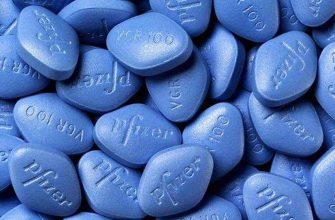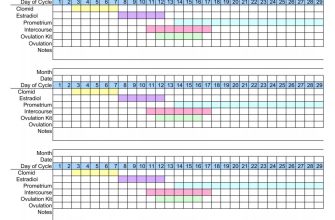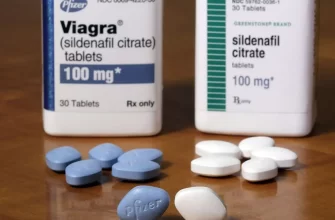Choosing a generic version of Viagra can offer a cost-effective solution for many looking to treat erectile dysfunction. Generics like Sildenafil have gained popularity due to their similar efficacy and safety profiles compared to the brand-name counterpart. They serve as a reliable option, delivering the same active ingredient that facilitates improved sexual performance.
It’s crucial to ensure that any generic medication is obtained through licensed pharmacies. This helps to avoid counterfeit products that may not meet safety standards. Always consult a healthcare professional before starting a generic medication to confirm that it’s suitable for your individual health needs.
Generic Viagra not only saves money but also comes with the same dosage options as the branded version. These variations allow for personalized treatment plans tailored to specific requirements. Consider discussing with your doctor about the appropriate dosage and potential side effects to achieve optimal results.
Staying informed about the legal status of generics in your country can also help you make informed decisions. Regulations often change, so checking local laws regarding prescription medications will ensure compliance. Generic Viagra presents a viable path to regain confidence and enhance quality of life without breaking the bank.
- Viagra Generic Status
- Availability of Generic Options
- Comparison Table: Brand vs. Generic Viagra
- Understanding Generic Medications
- How Generics Are Approved
- Cost Benefits
- History of Viagra and Its Patent Expiration
- Impact of Patent Expiration
- FDA Approval Process for Generic Viagra
- Differences Between Brand Name Viagra and Generics
- Current Generic Options Available in the Market
- Popular Generic Brands
- Dosage Forms and Availability
- Cost Comparison: Generic Viagra vs. Brand Name
- Potential Side Effects of Generic Viagra
- Legal and Regulatory Issues Surrounding Generic Viagra
- Patent Challenges and Exclusivity
- FDA Regulations and Approval Process
Viagra Generic Status
Generic Viagra, known by its active ingredient sildenafil, is available and provides a more affordable option for those seeking treatment for erectile dysfunction. The patent for the brand-name version expired in 2020, allowing other pharmaceutical companies to produce and sell generic versions.
Availability of Generic Options
Patients can find various generic forms of sildenafil through pharmacies and online retailers. These generics are typically lower in price, making them more accessible. It is crucial, however, to procure medications from reputable sources to ensure safety and efficacy.
Comparison Table: Brand vs. Generic Viagra
| Feature | Brand Viagra | Generic Sildenafil |
|---|---|---|
| Cost | Higher | Lower |
| Active Ingredient | Sildenafil Citrate | Sildenafil Citrate |
| Insurance Coverage | May vary | May vary |
| Formulation | Tablets | Tablets, available in different strengths |
Consult a healthcare provider before switching to generic options. Your doctor can guide you on the appropriate dosage and address any concerns regarding efficacy or side effects.
Understanding Generic Medications
Generic medications provide an affordable alternative to brand-name drugs without compromising quality. These drugs contain the same active ingredients, dosage form, and strength as their branded counterparts. They undergo rigorous testing to ensure they meet the same safety and efficacy standards set by regulatory bodies.
How Generics Are Approved
The FDA reviews generic medications through an Abbreviated New Drug Application (ANDA). Manufacturers must demonstrate that their product is bioequivalent to the branded version, meaning it works in the same way and offers the same benefits. This process ensures that generics can be trusted as reliable options for patients.
Cost Benefits
The lower price of generics stems from reduced research and development costs, as generic manufacturers do not need to invest in drug discovery. Patients often save significantly on out-of-pocket expenses through these alternatives, making medications more accessible. Insurance plans frequently encourage the use of generics to help manage healthcare costs.
History of Viagra and Its Patent Expiration
Viagra, known for treating erectile dysfunction, was introduced by Pfizer in 1998. The active ingredient, sildenafil citrate, was initially studied for its potential to treat hypertension and angina pectoris. During clinical trials, researchers noticed increased erections as a side effect, leading to its rebranding for erectile dysfunction.
Pfizer enjoyed exclusivity with the patent protecting sildenafil, allowing for significant profits. The original patent expired in 2013 in the United States, paving the way for generic alternatives. As a result, multiple manufacturers began producing generic versions, offering affordable options for patients.
Impact of Patent Expiration
The expiration of Viagra’s patent increased market competition, which led to a decrease in prices and expanded access for consumers. Generic forms of sildenafil became widely available, often at a fraction of the cost of the brand-name drug. This shift not only benefited patients financially but also stimulated further research in erectile dysfunction treatments, providing more options in the market.
As new competitors entered the scene, some pharmaceutical companies attempted to extend exclusivity through additional patents related to new formulations or delivery methods. However, the generic market for sildenafil remains robust, giving patients diverse choices while maintaining efficacy and safety.
FDA Approval Process for Generic Viagra
The FDA mandates a series of steps for the approval of generic Viagra (sildenafil). First, manufacturers must submit an Abbreviated New Drug Application (ANDA). This document demonstrates that the generic product is bioequivalent to the brand-name drug. Bioequivalence confirms that the generic will produce the same effects in the body as Viagra.
Next, companies need to provide evidence of the drug’s safety and effectiveness through clinical studies. These studies typically use a smaller patient population compared to initial trials for the branded version, focusing instead on how the generic performs in comparison to the original.
After successful completion of the studies, the FDA reviews all data for compliance with guidelines. This evaluation includes scrutinizing the manufacturing processes, ensuring they meet quality standards. Facilities used for production must also pass inspections to ensure they maintain the same standards as the original drug.
Once everything meets the required criteria, the FDA issues approval for the generic medication. This leads to increased market competition, often resulting in lower prices for consumers. It’s advisable for patients to consult healthcare providers for personalized advice, especially when switching from a branded to a generic version.
Monitoring continues post-approval, where the FDA tracks adverse effects to ensure ongoing safety. This rigorous process guarantees that generic Viagra can be trusted for use, offering an effective and affordable alternative to its branded counterpart.
Differences Between Brand Name Viagra and Generics
Brand name Viagra and its generic counterparts share the same active ingredient–sildenafil citrate–but differ in several key aspects.
- Cost: Generic Viagra is usually more affordable than the brand name version. Manufacturers of generics do not bear the costs of marketing and advertising that brand-name companies do, translating to lower prices for consumers.
- Inactive Ingredients: The excipients, or inactive ingredients, can vary between the two. These may affect the pill’s color, shape, and taste, but not the efficacy of the active ingredient.
- Manufacturer: Brand name Viagra is produced by Pfizer, while generics can be manufactured by various companies. Quality control and manufacturing processes may differ, though all must meet FDA standards.
- Availability: Generics tend to be more widely available in pharmacies once the patent for the brand name expires, increasing accessibility for patients.
- Perception: Some patients prefer brand name Viagra due to perceptions of reliability and effectiveness. Others opt for generics because they provide the same active ingredient at a reduced cost.
Consult with a healthcare provider to determine which option suits your needs best. Both versions are designed to treat erectile dysfunction effectively, but individual preferences and circumstances can influence the choice.
Current Generic Options Available in the Market
Generic Sildenafil citrate products are widely available and provide options for those seeking alternatives to brand-name Viagra. Among the leading choices are medications from established manufacturers ensuring quality and consistency.
Popular Generic Brands
Commonly found generics include Revatio, which shares the same active ingredient and is often prescribed for pulmonary hypertension. Other notable generics like Kamagra and Silvitra are marketed primarily overseas and may vary in formulation, but they generally contain Sildenafil. Familiarity with these brands helps in making informed decisions about efficacy and safety.
Dosage Forms and Availability
Generic Sildenafil typically comes in various strengths, including 25 mg, 50 mg, and 100 mg tablets. The diverse options allow patients to consult their doctors for the best dosage tailored to their needs. It’s essential to purchase these medications from reputable pharmacies or licensed online platforms to ensure authenticity.
Always consult with a healthcare professional before starting any new medication, including generics, to confirm suitability and to discuss potential side effects or interactions with other treatments.
Cost Comparison: Generic Viagra vs. Brand Name
Generic Viagra typically costs 30-50% less than the brand name version. For instance, a 30-day supply of brand-name Viagra may range from $600 to $800, while the generic version is often available for $200 to $400. This significant price difference allows users to save money without sacrificing quality.
Insurance coverage can also affect these costs. Many insurance plans cover the generic version but may not cover the brand name. Checking your specific insurance policy can help you understand which option is more affordable for you.
Pharmacy discounts and online options can provide additional savings. Some online pharmacies offer generic Viagra at competitive prices, which can be even lower than local pharmacies. Always ensure the online pharmacy is reputable to avoid counterfeit products.
Comparing prices among different pharmacies is advisable. Prices can vary significantly, so calling local pharmacies or checking their websites can help you find the best deal.
In conclusion, choosing generic Viagra offers substantial savings while maintaining the same active ingredient as the brand name. Assess your options to find the approach that best fits your budget and needs.
Potential Side Effects of Generic Viagra
The use of generic Viagra can lead to various side effects. While many tolerate the medication well, it’s important to be aware of potential reactions.
- Headaches: Commonly reported, headaches can occur due to vasodilation.
- Flushing: A reddening of the skin, particularly on the face, can happen as blood vessels expand.
- Dyspepsia: Some individuals may experience indigestion or discomfort in the stomach.
- Nasal Congestion: A runny or stuffy nose can result from the medication’s effects on blood flow.
- Vision Changes: Alterations in vision, such as increased sensitivity to light or blurred vision, may occur.
- Back Pain: Some users report muscle discomfort or pain in the back.
- Rash: Skin reactions, including redness or irritation, can manifest.
Rare side effects include:
- Priapism: An erection lasting more than four hours requires immediate medical attention.
- Hearing Loss: Sudden loss of hearing has been observed in some cases.
If you experience severe reactions or persistent side effects, contact a healthcare provider. Discuss your medical history, particularly if you have cardiovascular issues. Adhering to the recommended dosage can minimize risk. Regular check-ins with a healthcare professional can ensure the benefits outweigh any potential complications.
Legal and Regulatory Issues Surrounding Generic Viagra
The approval and market entry of generic Viagra (sildenafil) involve multiple legal frameworks. Pharmaceutical companies must comply with the Hatch-Waxman Act, which allows generic manufacturers to file Abbreviated New Drug Applications (ANDAs) once the patent on the brand name drug expires. This act streamlines the process for generics, enabling quicker access to the market.
Patent Challenges and Exclusivity
Many generic manufacturers face patent litigation initiated by the original brand holder, which can delay the introduction of generics. Legal disputes often focus on patent validity and infringement claims. Generic companies must conduct thorough investigations to navigate through patent claims effectively. Some industries allow for market exclusivity periods, further complicating the landscape for generics.
FDA Regulations and Approval Process
The Food and Drug Administration (FDA) plays a critical role in monitoring generic Viagra’s safety and efficacy. All generics must demonstrate bioequivalence to the brand-name drug, which is assessed through clinical studies. The FDA mandates rigorous testing to ensure that generics provide the same therapeutic effects as the branded version. This regulatory scrutiny builds consumer trust and safeguards public health.
Understanding these legal and regulatory nuances is vital for stakeholders in the pharmaceutical industry. Awareness of ongoing patent challenges and FDA requirements will facilitate informed decisions and pave the way for successful market entry of generic alternatives to Viagra.






